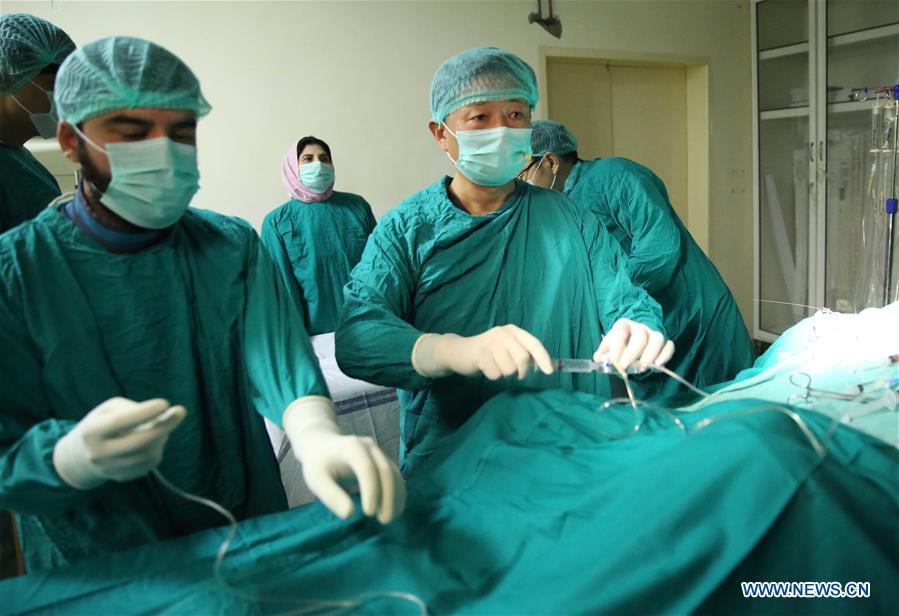Feature: Chinese cardiologists under B&R Initiative pass on expertise, innovation to Pakistani counterparts
- Jamil Bhatti
 0 Comment(s)
0 Comment(s) Print
Print E-mail Xinhua, 10 18, 2018
E-mail Xinhua, 10 18, 2018

Wu Yongjian (R), the leader of the Chinese doctors' team, performs an operation at Mayo Hospital in Pakistan's eastern Lahore city, on Oct. 5, 2018. TO GO WITH Feature: Chinese cardiologists under B&R Initiative pass on expertise, innovation to Pakistani counterparts. (Xinhua/Liu Tian)
by Jamil Bhatti
ISLAMABAD, Oct. 15 (Xinhua) -- The central conference hall of the cardiology department of Mayo Hospital in Pakistan's eastern Lahore city was packed recently with a number of curious cardiologists who were watching live on TV a team of Chinese doctors conducting a non-surgical procedure in the hospital's operation theater.
The hall buzzed with applause from the Pakistani doctors when the leader of the Chinese team, Wu Yongjian, completed the Percutaneous Coronary Intervention (PCI) procedure on a patient with complications, innovatively and in a comparatively short time.
Wu, director of the cardiology department of the Fuwai Hospital Beijing, had led a team of Chinese cardiologists under the Belt and Road Interventional Cardiology (BRIC) program and participated in academic activities in Pakistan by attending lectures and giving case demonstrations to train Pakistani cardiologists and technicians.
Wu, live from the operation theater, orated about the latest cardiology technics and procedures besides answering queries raised by the attendants.
Last month, the Pakistan Society of Interventional Cardiology (PSIC), the Chinese Medical Doctor Association (CMDA) and the Chinese Cardiovascular Association (CCA) signed a memorandum on the Belt and Road Interventional Cardiology (BRIC) Training Program, aiming to establish a long-term exchange and cooperation platform.
Under the agreement, Pakistani fellows would get specialty training in China and Chinese experts would visit Pakistan to conduct case demonstrations to share their medical and technology management experience.
Nauman Ali, a senior cardiologist from Lahore who watched the case demonstrations and raised several questions about the procedure adopted by Wu, told Xinhua that it was a golden opportunity for doctors like him to learn modern techniques and technology from Chinese doctors. He hoped that such exchanges and cooperation would continue to provide more exposure to Pakistani fellows.
Wu, who is also a committee member of the BRIC Training Program and a representative of the CCA, told Xinhua that he firmly believed that the recent activities will increase collaboration among Pakistan, China and other countries along the Belt and Road.
According to the Journal of Pakistan Medical Association and National Health, the Pakistani population has one of the highest risks of coronary heart disease in the world, as 30 to 40 percent of all deaths in Pakistan are due to cardiovascular diseases.
The major risk factors, including tobacco use, alcohol use, high blood pressure, high cholesterol, obesity, diabetes, physical inactivity, stress and unhealthy diet, cause 200,000 casualties annually in the country, along with presenting 350,000 new cases every year.
Head of Cardiology Department of Mayo Hospital, Saqib Shafi, told Xinhua that it is of great importance that the world-renowned Chinese professors and doctors have come to Pakistan for academic and professional training purposes.
"Chinese doctors are at a very high level in terms of medical expertise and their teachings are improving the skills of our senior and junior doctors," Shafi said, hoping that the collaboration with China would be converted into a long-term relationship that will help Pakistan modernize its healthcare sector by utilizing the latest technical training and medical education.
On Saturday, Pakistan's premier postgraduate medical institution conferred the country's top medical honorary degree of Fellowship of the College of Physicians and Surgeons (FCPS) upon four Chinese doctors for the first time to recognize their services as medics.
Wu was among the Chinese doctors who were honored by the College of Physicians and Surgeons Pakistan (CPSP).
On the occasion, Wu vowed to play an active role to increase cooperation and collaboration between the two sides in the health sector, especially in the cardiology section.
President of the CPSP Zafar Ullah Chaudhry said Pakistan wanted to collaborate with China in every field of the health sector under the Belt and Road Initiative.
"China is advanced in multiple fields and we can learn from them, while in some areas, Pakistan is in a better position so we can share our expertise and experiences with them," Chaudhry said.
Talking about the recent medical exchanges between China and Pakistan, Health Minister of eastern Punjab province Yasmin Rashid told Xinhua that it is a good beginning for future collaboration between the two countries for medical education and healthcare.
She added that her ministry is looking forward to further cooperation with China, which can help Pakistani professionals and common people.
"As a doctor, I know that a hospital can provide good services even in a poor building if the required trained medical staff are present. But Pakistan is running short of newly trained medics with the most recent methodology to tackle the rising number of patients," said the minister.
The minister said there are more than 175,000 registered doctors in Pakistan and the majority of them are lagging behind in medical training and the use of advanced medical equipment. She hoped that further doctor and medical staff exchange programs could be established between the two countries to address the issue.


